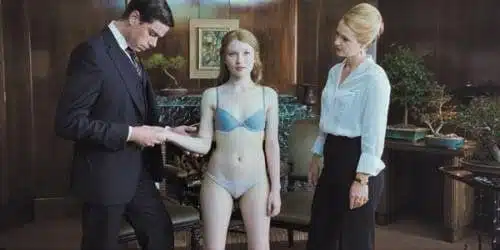
From start to finish, Sleeping Beautyis a mesmerizing and profoundly disturbing piece of work, one that derives a good dose of its power from always keeping us off balance and unsure about what will happen next. This is clearly the intention of its director, novelist-turned-filmmaker Julia Leigh; at a Q&A session after the screening of the film, a member of the audience accused her of “failing to explain what the meaning of the movie is”. Leigh sat there stony-faced and rolled her eyes.
The film, a clever and knowing perversion of the fairy tale, centers on Lucy, played by Emily Browning, a university student in Sydney who could be completely normal. But she is not, and Leigh chooses to withdraw her completely from any wider interactions with society and depict her working ata number of menial part-time jobs. She seems to view others with a certain disdain or contempt, but her interest is piqued when a strange advertisement appears in the newspaper.
In a stately lounge room, she meets Clara – Rachael Blake in a unflinchingly tough, matriarchal role – who tells her the specifics of her job. She will be a lingerie waitress, waiting on older men at their dinner parties. She will be ludicrously well-paid, with the prospect of promotion. These dinners, incidentally, have decidedly old-fashioned etiquette, with something of an old world décor; this as naked women keel in the fetal position by the fireplace. Some of the more outrageous lines in this film have already been publicized, such as when Clara instructs Lucy, “your vagina will not be penetrated. Your vagina will be a temple”. From there, the film gets even more nasty; Lucy drinks a tea which puts her to sleep. She is put in a room and men are allowed inside to do whatever they like to her except penetrate her. This occurs at Clara’s house, an ornate colonial mansion out in the countryside which leaves no doubt that this is a game of the elite.
Emily Browning gives a very game performance, and is ideal for the role with her porcelain-like appearance and ability to express a lot through almost nothing. There is no escaping the nudity in this film; it is there to confront you, at times to make you want to cower away from the screen. The implication that these older men are willing to indulge in expensive sexual fantasies with a younger woman because of a deep sense of personal shame or lack of ability to feel powerful will be very uncomfortable to some. At one point, one of the men turns to Clara and confesses that he feels his life has been wasted, as if this is a justification for his behavior; she stares on in a mixture of pity and horror. This scene, one of only a few where there is extended dialogue, is spellbinding.
Leigh’s filming style is taut, with an emphasis on formal perfection and mise-en-scene that makes Sleeping Beauty seem like an Australian cousin of Michael Haneke’s films. The room in which Emily is put to sleep, particularly, has a staging about it that is very particular and deliberate. It sets up a feel and distinctive look to the film that is highly accomplished for a first-time director.Leigh has described watching the film as being like a “witness” to its goings-on – she notably avoided the term ‘voyeur’. The dialogue has an unusual echo that makes what is being said sound more portentous, and it resonates within the film’s rooms of polished cedar. It’s also apparent that Leigh has many influences; I thought I could discern some Catherine Breillatin there, as well as traces of a performance art aesthetic of the kind that Marina Abramovic and Yoko Ono used to perform.
The film is also about the confusion and haze of the early twenties, as seen through Browning’s character who seems to care nothing for what others think of her, but becomes more curious as to what is being done to her while she’s asleep. In this sense, it doubles as an existentialist parable. Sleeping Beautycaptivated me; it is revolutionary in its style and approach to its subject matter, and people have already reacted strongly against it. But like Jane Campion’s first films (Campion was a producer and mentor on this film), I have a feeling it will be revisited and acknowledged for the genius that it is. The Sydney Film Festival has been buzzing with talk of it, and once you have seen it, it’s impossible to get out of your mind.

